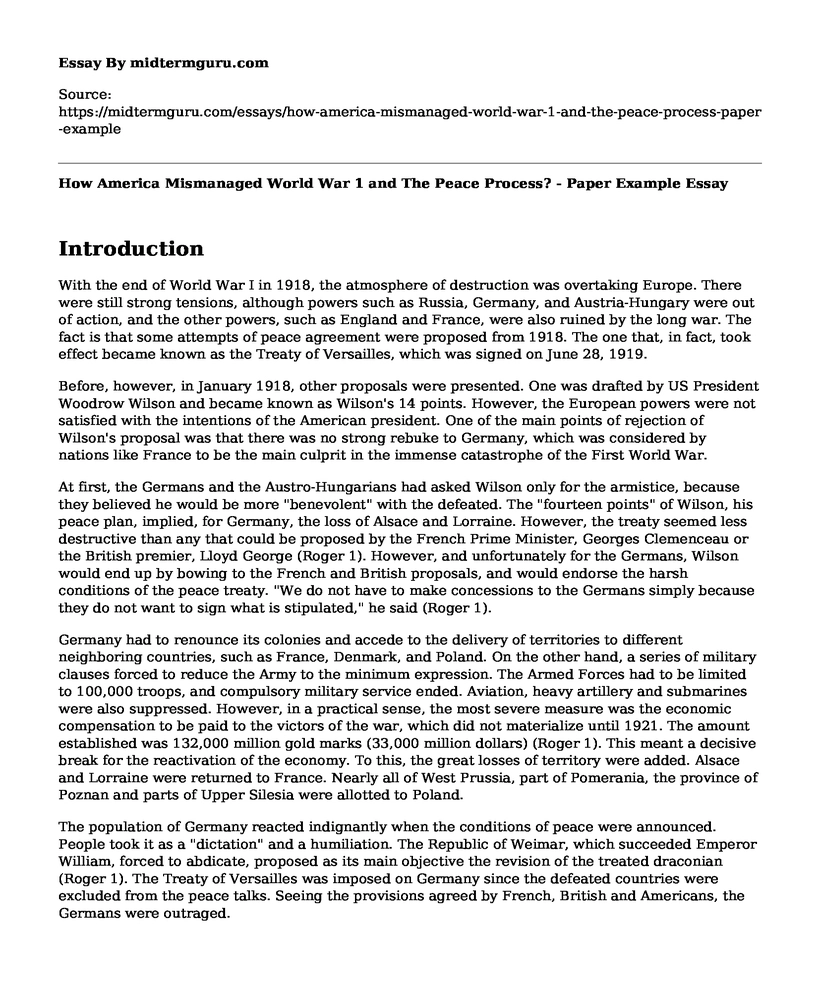Introduction
With the end of World War I in 1918, the atmosphere of destruction was overtaking Europe. There were still strong tensions, although powers such as Russia, Germany, and Austria-Hungary were out of action, and the other powers, such as England and France, were also ruined by the long war. The fact is that some attempts of peace agreement were proposed from 1918. The one that, in fact, took effect became known as the Treaty of Versailles, which was signed on June 28, 1919.
Before, however, in January 1918, other proposals were presented. One was drafted by US President Woodrow Wilson and became known as Wilson's 14 points. However, the European powers were not satisfied with the intentions of the American president. One of the main points of rejection of Wilson's proposal was that there was no strong rebuke to Germany, which was considered by nations like France to be the main culprit in the immense catastrophe of the First World War.
At first, the Germans and the Austro-Hungarians had asked Wilson only for the armistice, because they believed he would be more "benevolent" with the defeated. The "fourteen points" of Wilson, his peace plan, implied, for Germany, the loss of Alsace and Lorraine. However, the treaty seemed less destructive than any that could be proposed by the French Prime Minister, Georges Clemenceau or the British premier, Lloyd George (Roger 1). However, and unfortunately for the Germans, Wilson would end up by bowing to the French and British proposals, and would endorse the harsh conditions of the peace treaty. "We do not have to make concessions to the Germans simply because they do not want to sign what is stipulated," he said (Roger 1).
Germany had to renounce its colonies and accede to the delivery of territories to different neighboring countries, such as France, Denmark, and Poland. On the other hand, a series of military clauses forced to reduce the Army to the minimum expression. The Armed Forces had to be limited to 100,000 troops, and compulsory military service ended. Aviation, heavy artillery and submarines were also suppressed. However, in a practical sense, the most severe measure was the economic compensation to be paid to the victors of the war, which did not materialize until 1921. The amount established was 132,000 million gold marks (33,000 million dollars) (Roger 1). This meant a decisive break for the reactivation of the economy. To this, the great losses of territory were added. Alsace and Lorraine were returned to France. Nearly all of West Prussia, part of Pomerania, the province of Poznan and parts of Upper Silesia were allotted to Poland.
The population of Germany reacted indignantly when the conditions of peace were announced. People took it as a "dictation" and a humiliation. The Republic of Weimar, which succeeded Emperor William, forced to abdicate, proposed as its main objective the revision of the treated draconian (Roger 1). The Treaty of Versailles was imposed on Germany since the defeated countries were excluded from the peace talks. Seeing the provisions agreed by French, British and Americans, the Germans were outraged.
Conclusion
One of the problems that led to the failure of the treaty was the fact that the US Congress did not ratify the Treaty of Versailles and therefore did not enter the League of Nations. The decisions of the Treaty of Versailles, which were also applied to other countries, such as Italy, contributed to several waves of dissatisfaction and revolt in the following two decades: 1920 and 1930. German Nazism and Italian Fascism constituted the atmosphere of resentment which came after the First World War. The harsh conditions of the Treaty contributed to Germany's re-emergence worse than ever, with leaders like Adolf Hitler in the lead. The "failed peace" was the seed of Nazism. The Treaty of Versailles, which was to definitively put an end to war, contributed, along with the murderous madness of Hitler, to the outbreak of World War II.
Works Cited
Roger, Moorhouse. "Consequences of Peace: The Versailles Settlement, Aftermath, and Legacy 1919-2010". History Extra. N.p., 18 Jan. 2018. Web. 04 Oct. 2018.
Cite this page
How America Mismanaged World War 1 and The Peace Process? - Paper Example. (2022, Aug 18). Retrieved from https://midtermguru.com/essays/how-america-mismanaged-world-war-1-and-the-peace-process-paper-example
If you are the original author of this essay and no longer wish to have it published on the midtermguru.com website, please click below to request its removal:
- The Mysteries of the Egyptian Art, Pyramids and Architecture - Essay Sample
- Paper Example on Ancient China
- Paper Example on Prometheus Bound
- Essay Sample on the Second War for Independence and the Upsurge of Nationalism
- Essay Sample on Communism And The Cold War
- Food Packaging: Ancient History to Modern Society - Research Paper
- Literary Analysis Essay on Girls at War







